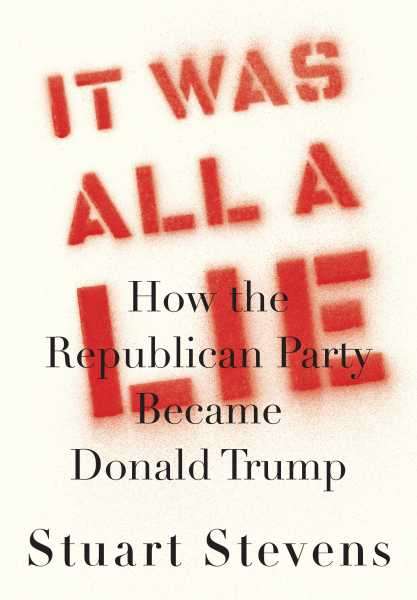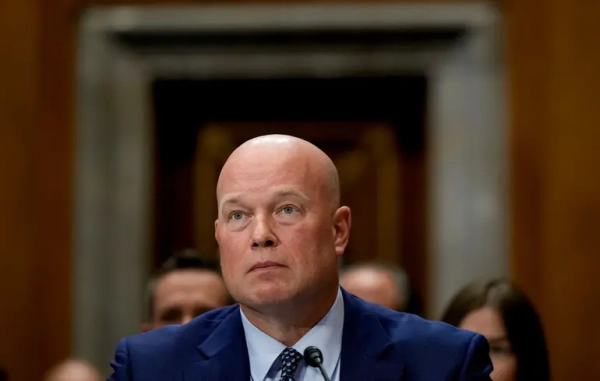
Of all the “Never Trumpers,” Stuart Stevens might be the most interesting.
Stevens is one of the most successful GOP operatives in the last couple of decades. He helped lead several presidential campaigns (notably George W. Bush’s two campaigns and Mitt Romney’s failed bid in 2012) and multiple gubernatorial and congressional races. He’s as seasoned as they come in Republican politics.
But Stevens stands out among Trump’s conservative critics because of his candor about the deeper rot at the core of the GOP. And in a new tell-all book, called It Was All a Lie: How the Republican Party Became Donald Trump, he offers a grand mea culpa for his own role in paving the way for Trumpism. “It is a strange, melancholy feeling to turn sixty-five, and realize that what you have spent a good portion of your life working for and toward was not only meritless but also destructive,” Stevens writes.
Stevens isn’t the only Republican who has criticized the GOP’s capitulation to Trump. He’s part of the Lincoln Project, a group of former Republicans who are spending a ton of money pushing anti-Trump ads. But he is somewhat unique for openly implicating himself and apologizing for his role in the party’s open embrace of nativism and bigotry.
I spoke to Stevens by phone about the story he wanted to tell in this book and why he insists that “Donald Trump did not change the Republican Party as much as he gave the party permission to reveal its true self.” Then we discuss which Republicans, in his words, “bamboozled” him by pretending to care about conservative principles only to toss them out the window the second it was convenient to do so.
A lightly edited transcript of our conversation follows.
Sean Illing
You call yourself a “fool” in the book for believing all those years that the GOP was based on a “core set of values.” What did you think the GOP was all about? And what is it actually about?
Stuart Stevens
Well, I would’ve said back in the Dark Ages, like four years ago, that 90 percent of the party would agree on some core principles. We could differ on issues here and there, but we all mostly believed in the importance of character, in personal responsibility, in free trade, in being tough on Russia, in fiscal sanity and legal immigration.
What gets me is not just that the party has drifted away from all of those things, because sometimes parties do that. It’s that we’re actively against all these things now. I don’t think we’ve ever seen anything like that in modern politics and I really don’t think we’ve seen anything like it in American politics. Just a complete moral and policy collapse of a party.
Sean Illing
Let me run something by you. You say “It was all a lie” and that’s a great title, but I look at all this and I say that the lie was the strategy and therefore not really a betrayal in the way you imply.
Here’s what I mean: For several decades, the party has worked hard to keep lower- and middle-class white voters drunk on grievances so that they don’t wake up one day and realize their pockets are being picked by plutocrats, and all that rhetoric about “family values” and “personal responsibility” and “states rights” was always a bait-and-switch designed to obscure the party’s real reasons for existing.
Am I wrong?
Stuart Stevens
It certainly isn’t what I believe, and I think it’s complicated. So you take the Bush era. We thought that it was an admirable policy that fewer people pay taxes. So it was a goal that if you were a family of four and you made $40,000 a year, you wouldn’t pay federal income tax. We thought that was the right way to go. In retrospect, it probably wasn’t the right way to go. It’s probably better if everybody pays lower taxes. But I don’t think the people that I worked with — from Bill Weld to Tom Ridge to George Bush to Mitt Romney — thought they were lying when they spoke for those core values. I think they believed it.
I don’t go through the book pointing fingers at this person or that person. I didn’t want to write that book. I think it’s more a collective failure, that if we really believed this stuff, the party would fight for it, but that simply didn’t happen. So that’s the conclusion that I come to in the book.
Sean Illing
You also come to the conclusion that it was always about race.
Stuart Stevens
Yeah, and this stuff goes all the way back to the “Southern Strategy” in the Nixon White House. Race is the original sin of the Republican Party and, again, you can see how this stretches back to 1964. There was obviously a racist element to the party before. I mean, now we view William Buckley as this lost erudite voice, but we forget that Buckley started out as a stone-cold racist defending segregation. His second book was defending McCarthyism. He later recanted and wrote eloquent stuff about why he was wrong. But that element was always there.
I never thought the party was perfect. I freely admit that I was a campaign guy. I admit it, it’s just the truth. I never worked in government. I never really thought a lot about it. I was always in the business of electing candidates and thought of my role like a defense lawyer. In retrospect, I wish had thought about it more.
Sean Illing
I guess my point is that there’s a tendency — one you mostly avoid — to say that the Republican Party lost its soul. But I don’t think that’s true, or at least it hasn’t been true since Barry Goldwater. It’s just the pursuit of power all the way down. Hell, the line from Newt Gingrich to Donald Trump is pretty straight.
Stuart Stevens
Well, I would look at Newt Gingrich as part of the dark side, but I don’t think that was true of George Bush. I really don’t. I think that he felt very passionately about expanding the party. He felt very passionately about the party appealing more to Hispanics. He really cared about education.
If you go back and you read his acceptance speech in 2000, it reads like a document from a lost civilization. It really is about humility and service and helping others. And I don’t think that was phony. I think Bush is incapable of phoniness. I think what you see is what you get with him. And that’s I think what he believed, and I think he believed he could take the party in that direction.
Look, I’ll be the first to say we weren’t perfect in Bush world. I mean, we played too much to the dark side. My biggest regret is signing the traditional marriage amendment in 2004. But that was a different era. I mean, in 2008, every presidential candidate, Democrat and Republican, was against same-sex marriage.

Sean Illing
There’s another way to read the history of the Bush years, but I take your larger point about his disposition. I want to push a little more on this idea that the hypocrisy of the Republican Party “should have been obvious” to people like you but wasn’t. I don’t believe that you were too naive or that you couldn’t see the hollowness of those “marketing slogans” you were peddling.
Was it really just the intoxication of winning?
Stuart Stevens
I was always optimistic to a fault. What I say is that I believed the better angels of the party would win, and I wanted to believe this. Now, how much of my believing it was because I wanted to believe it? I don’t know. I look back at 2016 and see that a lot of people were wrong about Trump. It’s very hard to find anybody who was more wrong than me. I didn’t think he’d win the primary, I didn’t think he’d win the general. And I realized in retrospect it’s because I didn’t want to believe that. I didn’t want to believe this party that I’ve worked in would nominate this guy who’s talking about having sex with his daughter in public. I didn’t think the party would do that. I was an idiot, but I didn’t. And Trump made all of this impossible to ignore.
So then there was the stage that a lot of people went through, and I went through for a while I guess, saying this isn’t really the Republican Party. But I don’t see how you can sustain that. It’s like trying to pretend that the Confederacy wasn’t about slavery. The party has abandoned any positive aspirations or values it might have had.
Sean Illing
The thing about Trump is that he’s so easy to understand. I mean, he’s a tiny tyrant and an emotional toddler.
But I’m dying to understand the political cowardice of Republicans who you say know better but can’t do what they know they ought to do. Are you sure that these people are actually morally conflicted about what they’re doing?
Stuart Stevens
I don’t think they’re morally conflicted. They all believe that Donald Trump is uniquely unqualified to be president of the United States. And they’ve come to grips with that. So I don’t think that they see that as a moral test, because they don’t see any of this as a moral test.
To me, Trump is a mirror image of segregation. I grew up in Mississippi and knew a lot of people that were really nice people. They wouldn’t have used a racist slur any more than cut off their right hand. But they were for segregation more than they were not. They were segregationists, and Trump is very much like that. You can’t negotiate with him or what he represents, in my opinion. What struck me is that maybe we shouldn’t be surprised at this. I mean, I think they’re cowards, but maybe cowardice is the norm, and we should be surprised and shocked by bravery.
I think the cowardice is contagious and courage is far less contagious. And I think the hallmark of the Republican Party is cowardice. No one can tell me that if these Republicans had been in power in 1775, we wouldn’t still be celebrating the Queen’s birthday. You can hear what they’d say: “We’re going to fight the King? Are you out of your mind? The most powerful army in the world? We’re going to work this out.”
Sean Illing
You say in the book that you were bamboozled by Republican politicians you worked with. Give me some examples. I want names, Stuart.
Stuart Stevens
I don’t want to get into naming names, because I think there’s a genre of books settling scores. And I think it invariably gets away from me taking responsibility for myself, because ultimately it’s up to me.
Sean Illing
Explain someone like Lindsey Graham or Susan Collins to me. In some ways, I feel like calling these people cowards lets them off the hook because it implies that they don’t actually believe in the terrible things they’re supporting, that they’re somehow complicit by dint of their circumstances. But I think the most charitable thing you can say about them is that they’re nihilists, and the least charitable thing you can say is that they’re far uglier than they’re pretending to be.
Stuart Stevens
I think they’re just interested in power and don’t care about anything else.
Sean Illing
I mean, isn’t that … nihilism?
Stuart Stevens
Yeah, that’s the conclusion I come to. That’s why I say the Republican Party really isn’t a political party. It’s a cartel. Why do cartels exist? Why does OPEC exist? To sell oil. Nobody says, “What is the moral purpose of OPEC?”
What does the Republican Party exist for now at the federal level? To beat Democrats —that’s it. There’s nothing else. There is no policy.
Say what you will about Elizabeth Warren, she can at least articulate a theory of government. You can hate it or you can love it, but you can argue with it and she’ll defend it. Can anybody do that on the right with any credibility?
I don’t think I’ve seen anything like it. I compare it to the collapse of the Communist Party in the Soviet Union, where the gap between reality and what the party was saying was so massive that it collapsed. I think we’re watching the collapse of the Republican Party. Actually, I know we are.
“The Republican Party really isn’t a political party. It’s a cartel.”
Sean Illing
You talk a lot about the redemptive power of leaders in the book, but here’s a deeper problem no one has a solution for. The Republican Party is essentially the conservative media universe now. You don’t have voters so much as customers, who’ve marinated for years in a carefully curated unreality where the only unifying principle is owning the libs, and no one can lead this party now without bowing to this element.
What the hell do we do about that?
Stuart Stevens
I actually have a darker view of things.
Sean Illing
Really?
Stuart Stevens
The Republican Party created Fox News. Fox News didn’t create the Republican Party. Roger Ailes just realized this. He didn’t make people like Italian food, he just opened up an Italian restaurant, and it became really popular. And I think that’s more damning because it means Fox only exists because there’s a market for it. So getting rid of it won’t solve any problems. Something else will emerge to take the place of Fox.
Sean Illing
Can there be any accountability for the GOP after Trump? You say the party should be burned to the ground, but what does that even look like?
Stuart Stevens
Well, is it going to be 1964? That’s definitely accountability. Listen, this is why we’re called the Lincoln Project. We have some skills, and we’re doing everything we can to try to beat Trump and Trumpism. I mean, Trump’s out there attacking us, all these people attack us. It’s like, “Are you kidding? We’re political consultants. Attack us all you want.”
We’re not confusing this with any kind of personal nobility. We’re just like carpenters and we can build these things. So I don’t know what else to do. I wake up every day trying to beat this guy.
Sean Illing
You know how it will play out, Stuart. If Trump gets destroyed in November, all of these spineless Republicans will wake up the next day and pretend that none of this shit happened.
Stuart Stevens
Oh, no question about it. I think we’re in for a long period of Democratic government. The country’s future will be decided inside the Democratic Party. The Republican Party won’t have anything to do with it. They can’t come up with an alternative. They don’t want to come up with an alternative. So the battle within the Democratic Party between the AOC or Bernie Sanders wing and the Biden wing, or whatever you want to call them, that’s the debate now.
I don’t see how the Republican Party comes back from this. I think they’ll lose and lose big moving forward. What Hemingway said about going bankrupt also applies to the death of political parties: It happens slowly and then all at once. And as I keep saying, once you have a major political party that validates hate, it’s very hard to undo. And that’s what the Republican Party has done.
Will you become our 20,000th supporter? When the economy took a downturn in the spring and we started asking readers for financial contributions, we weren’t sure how it would go. Today, we’re humbled to say that nearly 20,000 people have chipped in. The reason is both lovely and surprising: Readers told us that they contribute both because they value explanation and because they value that other people can access it, too. We have always believed that explanatory journalism is vital for a functioning democracy. That’s never been more important than today, during a public health crisis, racial justice protests, a recession, and a presidential election. But our distinctive explanatory journalism is expensive, and advertising alone won’t let us keep creating it at the quality and volume this moment requires. Your financial contribution will not constitute a donation, but it will help keep Vox free for all. Contribute today from as little as $3.
Sourse: vox.com






